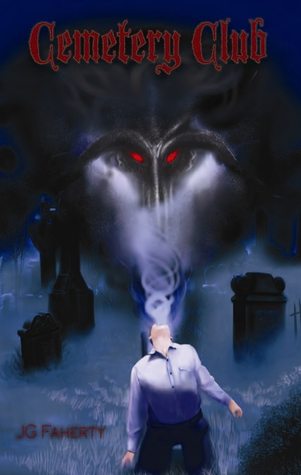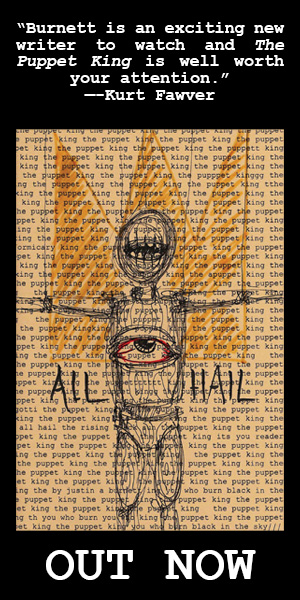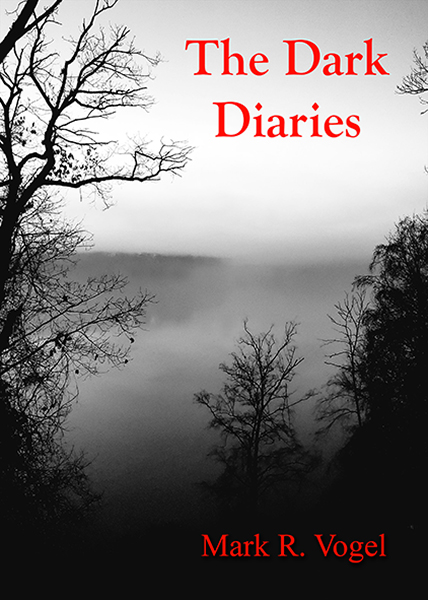JG Faherty is the author of The Cemetery Club (which we just reviewed here) and we’ve had a chance to sit down with him about the novel and writing in general!
Buy Zombie: Can you provide a brief summary of your novel, The Cemetery Club?
JG: 20 years ago, four friends awoke an ancient evil beneath the town of Rocky Point. They thought they had stopped it. But when the murders start again, the Cemetery Club has to reunite and put an end to the malevolent force, before the whole town is dead. Or worse.
Buy Zombie: What were your motivations to write this novel?
JG: I don’t know if motivation is the right word. I came up with the idea of having zombies that aren’t really zombies, but rather possessed bodies. Then I had to do some research to find out what could do this, and I found the Shades. Then I needed a plot to create a town with centuries of negative energy, and immediately I thought about the abandoned institution in my town, where in the 30s and 40 the residents were experimented on – vaccine research, shock therapy, etc. – and lived in terrible conditions right up until the 1980s. There’s even a cemetery with more than a hundred unmarked graves. From there, it was just a matter of filling in the rest of the story.
Buy Zombie: Considering the overall plot, were you aware that it ‘borrowed’ from several existing books and films? Was this a form of homage to those authors and screen writers?
JG: When I was about halfway through the book, I realized there might be some comparisons to King’s IT or some of the other books that have used the model of people coming back to their hometowns to finish what they started decades earlier. But I didn’t worry about it too much, because my plot was different, the monsters were different, and so on. I know in your review that you compared it to Carpenter’s ‘The Fog,’ and I never even thought about that. My monsters don’t come back for the same reason, and technically my zombies aren’t the monsters, they’re the victims.
Buy Zombie: As this is your first foray into the zombie/apocalyptic genre, what made you look at this sub-genre to horror?
JG: I guess the answer is both yes and no. I used zombies in one of my chapters in CARNIVAL OF FEAR (that book is a total homage!). I’ve used them in a couple of short stories. I’ve also written some short stories that were apocalyptic in nature, both with and without zombies. But I don’t consider this an apocalyptic book in the same sense as Night of the Living Dead or THE RISING.
As for why I chose this sub-genre to write about this time, I didn’t. I don’t choose the story, it comes to me and I just write it down!
Buy Zombie: When you sit down and write, what is your perfect writing environment, Quiet, Music, a specific room in the house? What helps get you in the mood? Watching classic horror films or…?
JG: I do all my writing in my home office, either in the early morning or the late afternoon, depending on my schedule. I like it quiet most of the time. Sometimes, when I’m having trouble getting ‘in a groove,’ I might put on either a classic metal station or classic new wave on Sirius/XM. When I’m deeply involved in writing a book, I don’t read or watch much horror because I don’t want to be influenced at all by it. Instead, I read and watch stuff in between projects, to sort of recharge my brain.
Buy Zombie: What kind of research did you do to get the ambience of the story setting, the environment, incorporating background historical events into the plot, attitudes of the characters, developing the characters specifically Cory, Marisol, Todd, and John?
JG: I do as little research as necessary, and as much as I need. For CEMETERY CLUB, I had to do some research on the history of vaccination research on patients in the early 19th century. I also had to do a little research on how people dressed and spoke in the 1700s and 1800s. Everything else I either made up or ‘borrowed’ from my own town in terms of neighborhoods, buildings, etc. I also had to do some research on Marisol’s job as a junior coroner, since it’s been 20 years or so since I worked in the medical field. None of the characters in the story were based on anyone I know, although I have used real people as the basis for characters in the past.
Buy Zombie: What were the major deciding factors to incorporate supernatural events with reanimation, i.e., zombies?
JG: None of the zombie stories I’ve ever written used shambling, mindless corpses. I am very bored with traditional ‘Romero’ type zombies. I didn’t want mine to be like them, and I didn’t want any kind of scientific cause for their existence. So I had to find a totally supernatural cause, something that tied into the town’s history and the actions of the Cemetery Club. And my research turned up the Shades.
Buy Zombie: What advice can you impart to other authors who want to use a similar element into a zombie/horror/apocalyptic genre novella/novel?
JG: Don’t! Why use what I’ve used? Find something that’s different, unique. As a writer, you’re only limited by 2 things: Your imagination, and what’s been done already. Romero has his walking dead; Keene has his dead possessed by beings from another dimension. People have used bacteria, viruses, chemicals, and radioactivity to create zombies. I used the concept of negative energy creating ghostly demons that can take over living bodies. So I’d hope the next zombie book to come out would be different than all of them.
Buy Zombie: Who do you feel is directly responsible for your entry into the horror genre and specifically the inclusion of zombies into your work?
JG: My writing in the horror genre can probably be traced back to my parents. As a young child, I loved watching monster movies – the classics of the 30s and 40s, and also the comedy horror of Abbott and Costello. From there I moved on to scary mysteries, like The Hardy Boys, and then real horror – Poe, Shelley, Stoker, etc. My parents were both avid readers, and they nurtured that in me, too. I worked my way through mysteries, science fiction, true science – but I always came back to horror. When I was in college, I tried to write a horror novel about a creature living in a lake. I got three chapters in and threw it out because I didn’t think I’d ever be as good as my favorite authors: King, Koontz, Straub, Wilson, Wagner, and the other greats of the 70s and 80s. I didn’t try writing fiction again until I was almost 40 years old.
As for including zombies in my work, it goes back to the concept of just following the ideas you get. In CEMETERY CLUB I wanted creatures who looked like zombies and acted like them – eating flesh, mainly – but weren’t zombies per say. I wanted them to be killable, but not easily so. And I liked the idea of having an evil danger that the heroes couldn’t quantify. Are they zombies? Aliens? Ghosts? Demons? If the heroes can’t tell, then they also can’t easily figure out how to stop them. Many years ago, Thomas Monteleone gave me some great advice: When you come up with an idea for a story, odds are it’s probably been done before. So take it and twist it around, make it something different. That’s what I did with this book: I took the zombie concept and molded it into something different. Instead of the undead coming back to life, my zombies are living people who get turned into the undead through possession.
Buy Zombie: What are your favorite books and films within this genre?
JG: If you’re talking horror, there are too many to name! For books, my favorite authors are Stephen King, Michael McBride, F. Paul Wilson, Peter Straub, early Dean Koontz, Robert McCammon, Brian Lumley, Shaun Jeffrey, Jeff Mariotte, and Jeff Strand. A couple of great up-and-comers are Jeffrey Wilson, Brett J. Talley, and Benjamin Kane Ethridge.
When it comes to movies, I prefer the ones that chill you through atmosphere and suspense rather than the bloody gross out. To me, films that rely on torture and disembowelment and cannibals for their scares are taking the easy way out. Give me a movie like White Noise, Alien, Paranormal Activity, or Signs any day.
Now, if you’re talking about the zombie sub-genre specifically, then I would say Night of the Living Dead, Dawn of the Dead, and the first Resident Evil movie. I also enjoy The Walking Dead on TV, because the zombies are not the main focus of the show; they are just a plot device to create the different situations for the characters. It always comes down to good plots and realistic characters. If you don’t have those – if you don’t care about the people who are in the book or movie – then it’s all a waste of time.
Buy Zombie: If you had to do it all over again, the writing, the publishing, etc, what would you do differently?
JG: Well, I’d start younger, that’s for sure! If I’d stuck with it in college, who knows where I’d be right now.
You can find out more about JG Faherty at his Official Website





